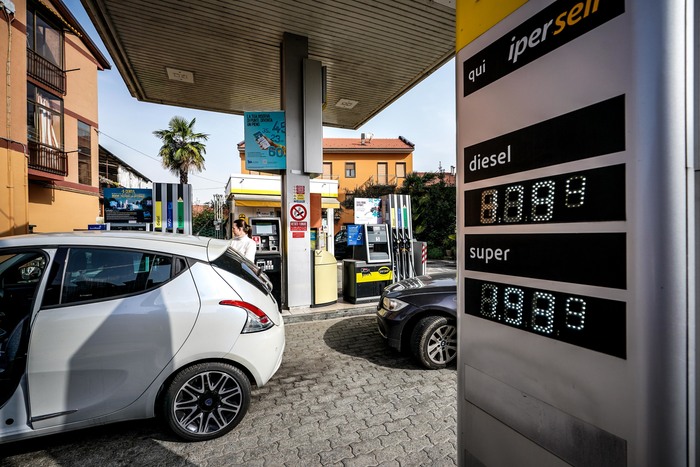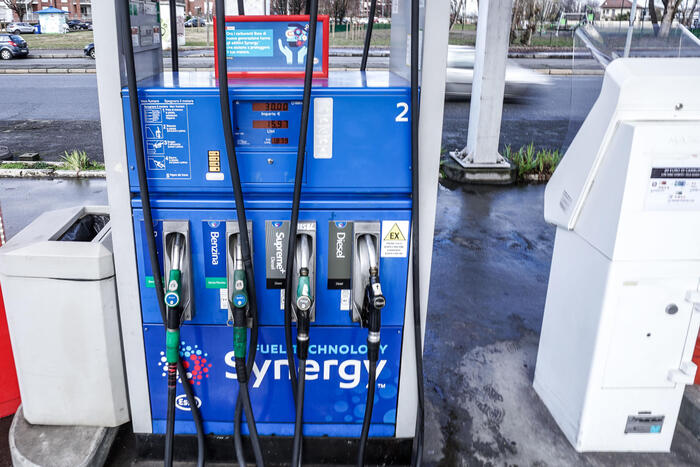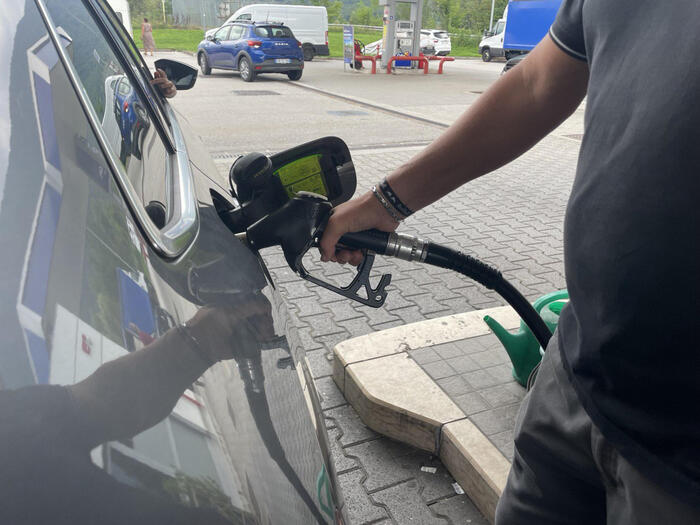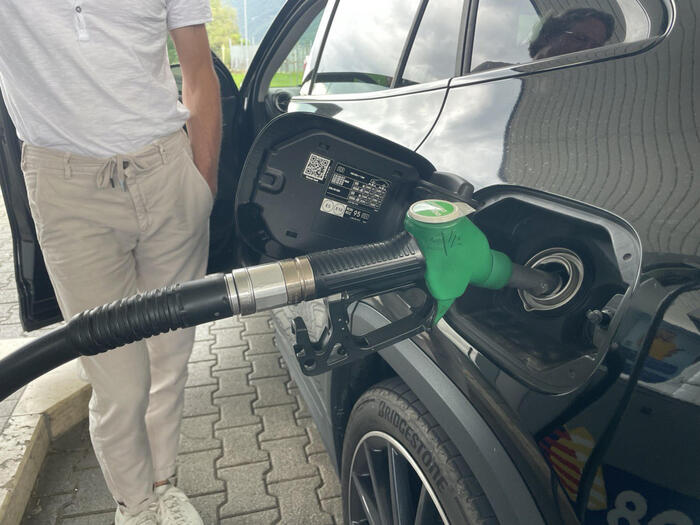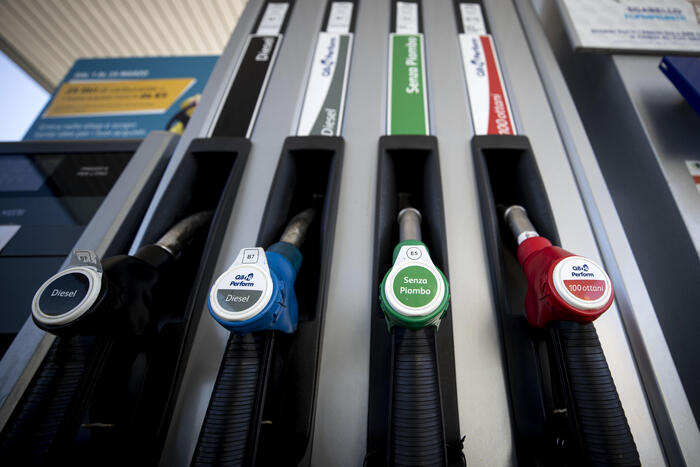Enlarge image
At the two-euro mark:
petrol station display for the Siegerland Ost motorway service station on October 13th
Photo: Rene Traut / IMAGO
Five marks per liter of petrol - not much is missing until the legendary unpopular election promise with which the Greens contested the 1998 federal election campaign.
That would be the equivalent of 2.56 euros if one ignores the other price level and the increased income.
The two-euro mark was broken several times at some petrol stations in October.
And that even before the Greens come back into government.
The traffic light coalition starts with a dilemma: should it make fuel more expensive in order to provide an incentive to switch off climate-damaging internal combustion engines?
Or make it cheaper so that citizens and companies are not overwhelmed?
The Federal Association of Medium-Sized Enterprises complains about a "massive burden on the economy".
Above all, companies in the transport sector such as haulage companies, but also the bus and train companies required for the turnaround in traffic, consume huge amounts of diesel.
The next largest consumers are the construction industry, trading companies and industrial companies with factory traffic.
For all of them, the high fuel prices bring an abrupt cost explosion.
The trade association is also concerned about the effect on the accounts of private households: With a weight of 3.5 percent, fuels and lubricants for vehicles are the second-largest item in the consumer price index; they are currently driving the high inflation. If this continues, so the fear, the unions could demand and enforce significantly higher wages.
The FDP is already bringing a "gasoline price brake" into play.
Party leader
Christian Lindner
(42) sees "unquestionably need for action" for the ongoing coalition talks - although his party wants to achieve climate protection primarily through the price mechanism, including more expensive gasoline.
The future opposition from the CSU to the Left Party brings relief into play, such as temporarily lowering the energy tax or the VAT on fuels or increasing the commuter allowance.
The climate tax has hardly any share in the fuel price
The current price increase has little to do with climate protection as a cause. At the beginning of the year, the CO2 tax, which was still decided by the grand coalition, was introduced, which charges not only heating but also fuels with 25 euros per ton of CO2. Converted to the liter of petrol, however, the surcharge is only seven cents (7.9 cents for diesel). Even together with the return to higher VAT, there is a politically induced price increase of only around ten cents, i.e. within the normal daily fluctuation in petrol station prices between morning rush hour and late evening. This effect was suddenly visible at the petrol stations on January 1st, but since then prices have continued to rise over the course of the year - three to four times as much.
Above all, the rising oil prices on the commodity exchanges determine how much more expensive petrol and diesel become - even in countries in which one has never heard of CO2 taxes. The global economic upheavals as a result of the Corona crisis have a much stronger and faster effect on fuel prices than climate policy would even think of.
The law provides for a gradual increase in the tax in annual steps to 55 euros per tonne of CO2 (equivalent to 15.5 cents per liter of petrol) in 2025. Then the price path should be checked. A more rapid increase could follow from the meanwhile tightened climate targets. At least the Greens and the Union spoke out in favor of it before the general election - and before the recent oil price rally. The scientific reports obtained before the introduction of the CO2 tax were based on more ambitious specifications anyway. The German Institute for Economic Research (DIW), for example, suggested starting 2020 with a levy of 35 euros and increasing it to 180 euros by 2030. In the end, that would be a surcharge of 42.63 cents (excluding VAT) on the liter of gasoline.
The idea behind this is a "steering effect" of the tax: households and companies would invest in more fuel-efficient vehicles or switch to public transport in view of the rising prices.
Volkswagen boss
Herbert Diess
(63)
also seems
to be hoping for
this effect
, who even after the election campaigned for an increase in the CO2 price to 65 euros by 2024.
It is hoped that this will accelerate the switch to electric cars.
The strong will to refuel
But is that also true? Does climate protection follow at least as an effect from more expensive fuel? That depends on how strongly the demand reacts to the price signal. In the short term, little is to be expected, according to the DIW study. Many are annoyed by rising fuel prices, but this does not necessarily mean that they refuel less. The fleet with fossil combustion engines is in operation. Just because gasoline suddenly becomes more expensive doesn't make a change of vehicle worthwhile. The DIW assumes a so-called price elasticity of demand of -0.13 for gasoline. This means that a price increase of 10 percent only lowers consumption by 1.3 percent. It is even less with diesel. Trucks, buses, excavators and tractors just have to keep going, no matter what the cost.
For reasons of resource protection
alone, Svenja Schulze's
(53, SPD)
Federal Environment Ministry
expressly
declares
rapidly rising fuel prices - as opposed to a calculable, gradual increase - to be undesirable: "Anyone who bought a car with a combustion engine only a few years ago should still do so can drive for a few years without being overwhelmed. " Seen in this way, a petrol price brake could also be represented with a green conscience.
The situation is different with regard to the long-term effect - but that too is under big question marks. If the buyers of new vehicles have time to adjust to the foreseeable more expensive fuel, this will reduce consumption over the years, according to DIW. On average, they assume a price elasticity of -0.7 - i.e. 7 percent less fuel consumption as a result of prices rising by 10 percent. However, estimates based on measurements of actual behavior differ widely, and even in the best-case scenario, a CO2 price of 180 euros per ton would not be enough to achieve the (old) climate target for the transport sector by 2030.
Ironically, one of the few more recent studies with reference to Germany even suggests that rising prices will have practically no effect in the long term.
DIW economist Carsten Schröder and Dragana Nikodinoska, at that time at the University of Kiel, measured an elasticity of -0.08 in the demand for gasoline and diesel in 2016.
Fuel that is 10 percent more expensive would therefore only be used 0.08 percent less.
The current queues at German petrol stations could confirm this pessimistic estimate.
Obviously, the will to refuel is stronger than the anger about the price.
In fact, significantly more gasoline is consumed than in the spring of 2020, when it was more than half cheaper due to the lockdown.
The traffic light partners have to come up with more than price signals if they want to achieve their climate goals.


